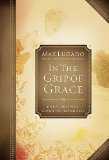In the Grip of Grace. By Max Lucado. Dallas: Word Publishing, 1996. 235 pages. Paper, $19.99.
Grace is the engine that drives the book of Romans. No wonder Lucado would turn there for his expositions on grace.
And exposit grace is what he does more than exposit Romans. Those looking for biblical exposition will be disappointed. However, if one wants to delight in the glories of grace, then this book will fulfill that desire. To be fair, Lucado doesn’t purpose to exposit the book, but only to “walk the mountains” of Romans (p. xiii). He relishes the scenery but usually does not try to analyze the trees. His observations favor the broader landscape of Romans and land on the high points. He even bases some chapters on passages outside of Romans.
The value of the book is two-fold. First, the author does a wonderful job of exploring, explaining, and illustrating grace. This has great devotional value. Second, he has such good illustrations, stories, parables, and analogies that those who preach and teach grace will find a treasure to draw from.
Lucado keeps grace abundant and free. Salvation remains solidly of grace. He recognizes the sad possibility that saved individuals can abuse that grace, but resists the temptation to withdraw grace in the face of sin, except to say, “if a person uses God’s mercy as liberty to sin, one might wonder whether the person ever knew God’s mercy at all” (p. 82). That’s as strong as he gets. Most statements deal with the reality of saved people who sin.
This shows great progress in one who unabashedly describes his Church of Christ roots in the book. In fact, he admits he has been influenced by many mainstream Evangelicals, several of whom he names (as well as the Roman Catholic author Brennan Manning). The reader will sense that he has in essence departed from the legalism that characterizes his denomination. This is clearest in Chapter 16, which is devoted to a parable of Christian unity. Where exactly he now stands is hard to tell. I have read some of his other books and found occasional lapses in clarity on the gospel. But here, reading was a delight. Let him write his next book on sanctification or discipleship, and we may see. Though more refinement of views would help, it seems Lucado is becoming not only more grace-oriented, but also more careful and cohesive in his theology.
The only view that blatantly clashed with my own was his view from Romans 1 that all who respond to God’s general revelation in creation will be saved: “One need only respond to what he is given. And if he is given the testimony of creation, then he has enough” (p. 23). Though other sincere Evangelicals hold this view, I think it diminishes the cross of Christ, Christ’s promises of eternal salvation, and Christ’s Great Commission.
So take this book with a grain of salt. What he says about grace is on target.
This book continues to reinforce Lucado’s reputation as a word artist. He challenges our thinking with new paradigms and applications. His style is friendly and light, not too serious. Though Lucado is extremely popular as an author, he is not taken with his own popularity, but even comes across as self-effacing.
A study guide written by Steve Halliday follows the main text.
If you want easy reading that will remind you of God’s glorious grace, I suggest this book.
Charles C. Bing
Director
GraceLife Ministries
Burleson, TX

